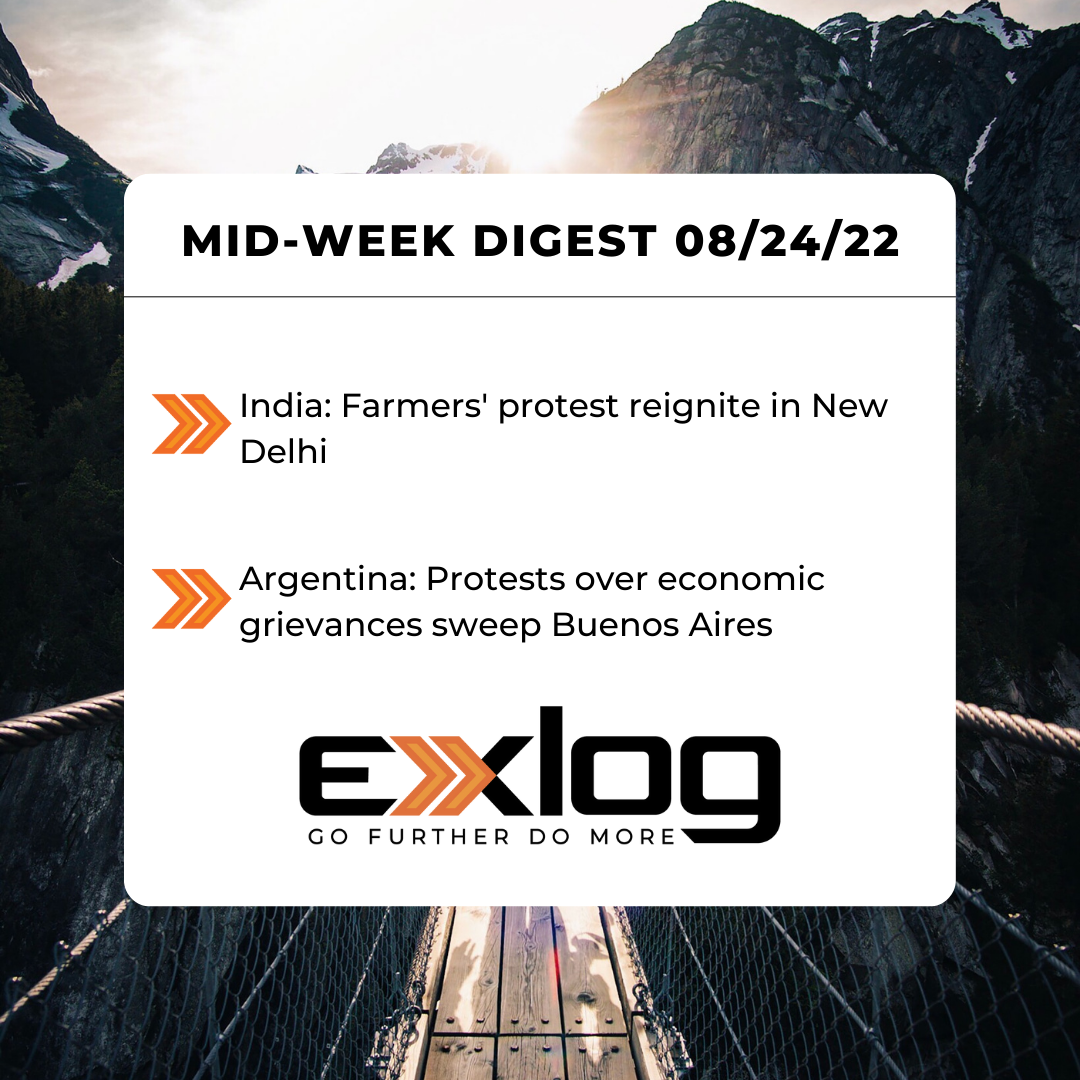renewed farmers’ protests in india and anti-government rallies in argentina
India: Farmers’ Protest Reignite in New Delhi
More than 5,000 farmers gathered for anti-governments protests in central New Delhi on Aug. 22, causing significant travel disruptions in the capital and triggering increased police presence around the protest site. Members of several farmers’ unions traveled from multiple regions, including New Delhi’s neighboring states of Punjab, Haryana, and Uttar Pradesh, as well as southern states of Karnataka, Maharashtra, Odisha, and Kerala. In response to the mobilization, New Delhi police erected barricades and conducted security checks at all entry points to the city, causing traffic disruptions along key routes, including the Delhi-Meerut Expressway, Palam flyover, Aurobindo Marg, Ring Road and the Munirka Road. Despite the overwhelming number of protesters and increased security measures in New Delhi, demonstrations remained peaceful and were concentrated around the Jantar Mantar site. The renewed labor unrest comes eight months after the unions called off a year-long protest against three controversial agricultural reforms upon reaching an agreement with the government in December 2021. In addition to New Delhi, farmers’ demonstrations have reignited in other regions in recent weeks due to the perceived lack of the government commitment to the concessions agreed upon last year, including a minimum support price for all produce and farmer debt forgiveness. On July 31, the Samyukt Kisan Morcha (SKM) – a coalition of more than 40 farmers’ unions – organized nationwide demonstrations and erected road and rail blockades throughout the country, disrupting supply chains and domestic travel in the states of Punjab, Uttar Pradesh, Rajasthan, Maharashtra, Gujarat and Haryana, among others. Most recently, the same organization held a 75-hour sit-in in Lakhimpur Kheri, Uttar Pradesh, on Aug. 18 in an attempt to pressure the government. While the impact of the most recent protests has been limited, precedent has shown that farmers’ unions have the capability to significantly disrupt government and economic activity, as well as road and rail traffic, for prolonged periods of time. Unless the government manages to swiftly address the protesters’ demands, SKM is likely to stage additional protests and strikes throughout the country in the short-to-medium term.
Argentina: Protests Over Economic Grievances Sweep Buenos Aires
Fresh anti-government protests over high inflation and low wages led to travel disruptions in central Buenos Aires on Aug. 17, indicating a worsening economic crisis in Argentina. Predominantly led by labor unions, such as the General Confederation of Labor (CGT) and the Argentine Workers’ Central Union (CTA), protesters marched along main avenues, including Avenida Belgrano and Avenida 9 de Julio, to the Congress building. Another group of protesters – composed of left-wing groups aligned with the ruling Frente de Todos party – reached Plaza de Mayo and held a demonstration in front of the Casa Rosada (the office of the president), demanding higher salaries and solutions to the rising inflation. The recent protests are not isolated events as demonstrations over economic grievances in Argentina have been ongoing since May 2020. Hovering around 70% in August, the inflation rate is expected to rise to 90.2% by the end of the year, according to the estimates from Argentina’s central bank. While the country has experienced high inflation for several years, the COVID-19 pandemic and the Russia-Ukraine conflict have exacerbated the pre-existing economic issues. Rising fuel and fertilizer prices triggered countrywide labor strikes and protests by agricultural and transportation workers in June and July. Demonstrations over a USD 45 billion loan agreement with the International Monetary Fund (IMF) escalated to violence in March when protesters burned tires, hurled stones outside the Congress building and clashed with security forces. In the absence of a comprehensive government response to the deteriorating economic climate in the country, labor unions and political activists are likely to stage additional protests in the near-to-medium term that have the potential to significantly disrupt travel and business operations in Buenos Aires. While the recent protests in the capital proceeded without incident, violence associated with future protests cannot be ruled out.


